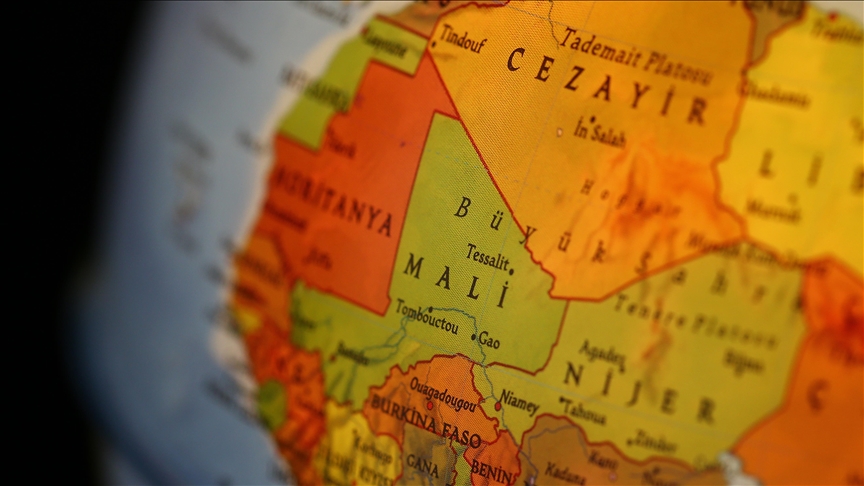Algiers Peace Agreement rides wave of uncertainty in Mali
More than 5 years after its signing, implementation is slow according to a signatory, while civil society still rejects it

LOME, Togo
May 15 marks the anniversary of a peace agreement signed in 2015 in the Algerian capital between the Malian government and the Coordination of Azawad Movements (CMA), an alliance of rebel groups in northern Mali.
"A comprehensive and lasting peace agreement," the reconstruction of national unity, the acceleration of development on all fronts, and the restoration of security and governance in line with the geo-historical and socio-cultural specificities of the northern regions are some of the areas in the roadmap signed in Algiers by the stakeholders.
Yet "the implementation of this agreement is dragging on, and for almost a year, things have not even moved," reported Moulaye Abdallah Haidara, the permanent secretary of the Arab Movement of Azawad, which is part of the CMA.
He told Anadolu Agency that he was genuinely dissatisfied with the developments, notably because of "the political and institutional reforms that have not moved at all.”
"The process of disarming armed groups and reintegrating ex-combatants into the security and defense forces or facilitating their return to civilian life has also not moved. It has been five years since 2,000 combatants were not reintegrated," he noted.
For Haidara, "this is almost a failure.” But he added that hope lies with the transitional authorities.
"Recently we have seen an intention and we are waiting for things to evolve. We hope because the transitional authorities have given us guarantees that it will be accelerated soon," he said.
For Konate Lasseni, a Malian sociologist and researcher, "it is true that the agreement was signed for peace, but until now, Malians have been yearning for this peace. There are still groups of terrorists who continue to spread terror throughout the country. There are also people who benefit from these conflicts and have no interest in peace. They fuel the conflicts.”
Lasseni also noted institutional obstacles in the agreement’s implementation.
Agreement misunderstood by population
On the other hand, there is a communication issue. Despite some awareness-raising events organized in the country to familiarize the population, "sociologically speaking, Malians do not recognize themselves in this agreement because there are some provisions that are not understood, and a complete re-reading is needed so that each citizen can benefit from it. There is still a lot to do," Lasseni said.
This explanation is similar to that of Mossa Ag Attaher, Mali’s minister of youth and sports and a former voice of the CMA, who was integrated into the government thanks to the Algiers Agreement.
"Much remains to be done in terms of informing and training citizens in general, and young people and women in particular, about the Agreement for Peace and Reconciliation in Mali, which came out of the Algiers process," he said last month in Bamako at the launch of a workshop to inform and train young people and women in Commune 5 of the District of Bamako.
The agreement, he said, contains provisions that should be known by all and everywhere in Mali to prevent various interpretations and comments that could jeopardize peace and national reconciliation.
In one go, Inhaye Ah Mohamed, the high representative of the president of the republic for the implementation of the agreement, recently noted the total lack of understanding by the population and a lack of trust between stakeholders.
'Unconstitutional and ethnocentric'
Beyond the communication problem, the agreement suffers from rejection by civil society actors, with several of them expressing their discontent.
This is also the case for the Malian group Front which refuses the implementation of the Algiers Agreement, finding the agreement "iniquitous, illegitimate, and ethnocentric."
"We are mobilizing today against it because it flouts our constitution and calls into question the Malian currency. It only benefits those who have pointed weapons against our country and who continue to wage a war by proxy," said Ibrahima Kebe, the group's coordinator, when contacted by Anadolu Agency.
He said the Algiers agreement favors the country’s domination by a minority ethnic group from the north which is however opposed by the majority of northern population.
According to Kebe, it imposes the will of a few without going through the ballot box on a majority that will never accept slavery and will lead to civil war that will engulf the entire sub-region.
Even if he recognizes that certain provisions, such as the territorial police that the Front rejects, have been applied and others continue to be applied, for Kebe, the implementation cannot be done in full.
"This agreement is not the solution to Mali's problems. It will not work and it will not pass," he added.
In his inaugural speech, Bah N'Daw, the president of the transitional government, said that for the honor of the West African country, "the Agreement for Peace and Reconciliation will be applied and will only be revised by agreement.”
Anadolu Agency website contains only a portion of the news stories offered to subscribers in the AA News Broadcasting System (HAS), and in summarized form. Please contact us for subscription options.



